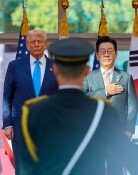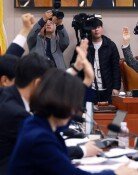[Editorial] Focus on Local Economies
[Editorial] Focus on Local Economies
Posted June. 01, 2006 03:00,
Those who will lead local governments and local councils for the next four years have been elected. They have pledged in one voice to support corporate investment and create quality jobs through injecting vitality into local economy. They should deliver what they pledged and turn the economy around. When the local economy is in good shape, the nation and the public will be in better shape.
Economic growth is slowing down again. Growing industrial activities are tapering off, and inventories are building up. President of the Korea Development Institute Hyun Jung-taik said, It will be difficult to maintain as rapid a growth rate in the second half as we saw in the first half of the year. Other private institutions including Samsung Economic Research Institute predicted that Koreas growth engine will lose its steam, slowing economic growth. Local economies look even gloomier with low consumption and the sluggish construction sector.
The central government is also unable to take care of every aspect of local economies. It is long on rhetoric only, such as balanced national development and innovative city. When companies regain vitality and increase investment, decent jobs are created and income increases, narrowing the gap between rich and poor. Yet the government failed to recognize or understand this simple principle. Thus it is incumbent on local governments to take care of their own economies. They should not waste time and the potential of the public blaming the current administration and the central government.
Governor of Gyeonggi Province Sohn Hak-gyu is an exemplary leader of a local government. Sohn has drawn $13.8 billion in direct foreign investment from 105 foreign companies since his inauguration in July 2002. Sixty percent of the promise put into action. Three days ago, the province signed an investment agreement worth $30 million with four Japanese companies in the semiconductor and LCD sectors. This will generate 500 new jobs. Sohn successfully attracted a 27 trillion won investment from LG Philips, which created 42,000 jobs, not losing the opportunity to China. Then Prime Minister Lee Hae-chan said, I am a league ahead of Sohn in politics, but a prime minister who can not create jobs only worsen the lives of the public.
Lee Seok-hyung, head of Hampyeong County in South Jeolla Province, attracted over three million people every year during Butterfly Festival to the remote county of 42,000 residents with no resources. Kim Heung-sik, head of Jangheung County in the province, boosted financial independence from 16 percent to 100 percent in 10 years by reinventing mindset of local government officials and boosting entrepreneurship.
New leaders of local governments should learn from these examples. They should employ outstanding creativity and determination in running the governments. Local small and medium sized companies are struggling with difficulties, which means the newly elects have their hands full. Local council members who receive salaries from this year should work harder to turn the local economy around and make the tax money worth. In New Jersey, one of the wealthiest states in the U.S., the governor and secretaries run around like businessmen for investment, however small they are.
Sohn boasted, Among 299,000 jobs created last year in Korea, 175,000 were generated in Gyeonggi Province, in a recent investment fair. The elected should be able to boast like Sohn when they finish their term. The vitality of local economy largely depends on their leadership, and economic performance determines whether they succeed or fail.
The central government, for its part, should refrain from placing burden on the people and local governments with excessive regulations, but it should emulate the success stories of local governments and change its policy direction to increase its support for the local governments and private sector. A government that competes with local governments has no hope.







